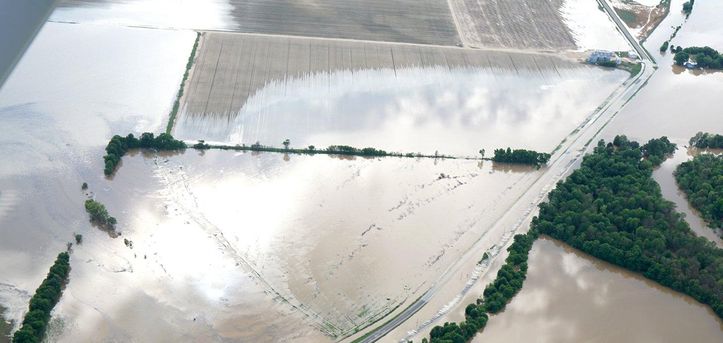Never ending rains could significantly impact early planting
by February 26, 2019 4:50 pm 585 views

Perpetual rains significantly impacted the harvest in 2018, and as the calendar creeps towards the start of early planting, the onslaught of rain is already threatening the 2019 season.
At production meetings organized by the University of Arkansas System Division of Agriculture in January and February, both growers and agronomists have noted the delay in field preparation for the upcoming planting season. It appears increasingly unlikely that any growers in the state will be able to plant rice on March 15, typically the start of the early planting season, Jarrod Hardke, rice agronomist for the Division of Agriculture said.
“Assuming it ever stops raining, you’re looking at seven to 10 days of dry weather before you can get a tractor out in a field,” Hardke said. “Seventy percent of rice acres in this state are rotated with soybeans, and the vast majority of those soybean fields haven’t been worked in any manner.”
Many growers will need to till their fields to a significantly greater degree than in typical years, Hardke said, due to widespread rutting caused by the 2018 harvest.
“We’re not talking about standard tillage,” Hardke said. “This will require excessive tillage.”
According to data from the National Weather Service, every county in the southeastern half of Arkansas received 30-50 inches of rain between Aug. 22, 2018 and Feb. 22, 2019. The measured rainfall ranged from 110% to 200% of typical rainfall within the same six-month period.
The sun has been shining across the state for the last few days, but according to NWS there will be a chance of rain each day for the rest of the week in Northeast Arkansas, and there’s even a slight chance of snow this weekend, the NWS predicted. The Black River, which borders many agriculture fields in Lawrence and Randolph counties is still under a flood warning.
Furthermore, many fields in the state likely still require fertilization.
Soil testing, which growers use to determine the nutrient needs of a field, typically precedes fertilization. Linda Moore, a technician with the University of Arkansas Soil Testing Laboratory in Marianna, said the laboratory had received about 13,800 soil samples from agricultural plots around the state from Jan. 22-Feb. 22, a notable decline from the norm, which is closer to 18,500 samples during the same period.
Robert Goodson, Phillips County extension agent for the Division of Agriculture, said most fields in his county are saturated, although water was draining well as of Friday (Feb. 22), although “that has the possibility of changing,” he said. The conditions are impacting corn producers, he said. Corn will be planted late, if at all, he added.
“The Mississippi River is at 43.8 feet, with a flood stage of 44,” Goodson said. The river is predicted to crest at 47.5 feet on March 5.
NWS has issued a flood warning for the Mississippi River until further notice. The Cache River, which floods at 9 feet was recorded at 12 feet. In White County, the White River was measured at Georgetown at 24.6 feet, more than 4 feet above flood stage.
